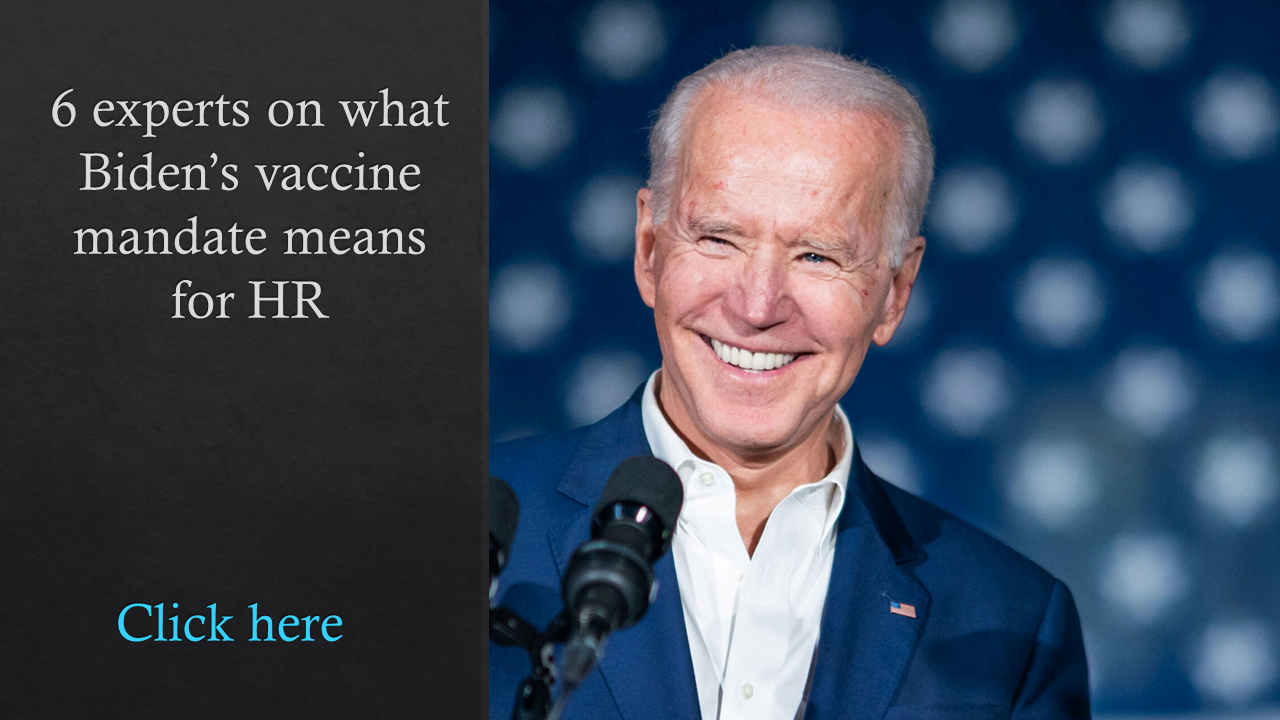Last month, President Joe Biden announced a series of plans to more aggressively tackle the COVID-19 pandemic–including a surprising announcement requiring scores of private employers to mandate their workers get vaccinated or undergo weekly COVID testing. The upcoming rule will have widespread implications for employers. So what exactly will the rule entail and how should company and HR leaders prepare? Here’s what to know.
What is it?
On Sept. 9, Biden announced he is directing the Department of Labor to draft a rule that will require all businesses with 100 or more employees to mandate that their employees get the vaccine or undergo weekly COVID testing. Those employers will also have to give workers paid time off to get vaccinated or recover from any side effects of getting vaccinated. Companies that violate the rule could be subject to fines of $14,000 per violation.
When will the mandate go into effect?
 The rule is expected to be issued in the coming weeks by the Department of Labor’s Occupational Safety and Health Administration, though a timeline has not been announced. It’s not clear when it will take effect.
The rule is expected to be issued in the coming weeks by the Department of Labor’s Occupational Safety and Health Administration, though a timeline has not been announced. It’s not clear when it will take effect.
Related: Mandating vaccines? How tracking tech can help with the next step
In the meantime, Biden is pushing employers to get ahead of his requirement by imposing their own vaccine mandates.
What about employers with fewer than 100 employees?
They currently are not subject to the rules, but they still can mandate vaccines on their own. In fact, as more employer mandates go into effect, they will become norms, Jillian Kornblatt, a labor and employment partner at Dorsey & Whitney, said recently during a webinar held by the Minneapolis-based law firm. That could mean employers that don’t put them in place will be considered to be violating “common practice,” she says, adding, “I think that’s an interesting area for those specific employers to keep an eye on.”
What do employers think about it?
Corporate America is largely supportive of the rule because it takes the decision of whether to mandate vaccines out of their hands. Many company leaders wanted to prioritize health and safety and reduce the risk of COVID-19 but have been hesitant to implement such mandates themselves, given polarization surrounding the vaccines and fears over losing employees in the tight labor market. “The administration’s approach will help equalize the playing field and take some pressure off employers who have been concerned about moving too fast or too early in this important area,” says Devjani Mishra, shareholder at Littler Mendelson and a leader of the firm’s COVID-19 task force.
A survey from the Committee for Economic Development of the Conference Board (CED) finds that nearly two-thirds of business leaders support Biden’s COVID-19 vaccine-or-test mandate for private companies. Forty-two percent of those surveyed said they “strongly agree” with Biden’s mandate, while 24% “strongly disagree.”
Plus, employers were already embracing vaccine mandates, with a growing number of companies requiring some or all of their employees to roll up their sleeves. Employers including Tyson Foods, Disney, Walmart and United Airlines announced COVID-19 vaccine mandates even before Biden’s announcement.
Still, there is hesitancy among some employers, especially those worried about employees leaving due to the mandate. There also are concerns about how the rule will be enforced. The CED survey found that about 56% of business leaders will find it difficult to implement the vaccine-or-test requirement, for instance.
Related: These employers are requiring COVID-19 vaccines
What should employers do as they wait for the rules?
As employers and employees await the rules from DOL, attorneys on the Dorsey & Whitney webinar offered five action steps for employers as they consider and respond to the coming regulations:
- Draft a vaccine or testing policy;
- Ensure vaccine requirements are in place and include potential exemptions for disability/religious accommodations;
- Determine if you’re a federal government contractor or subcontractor;
- Employers not currently covered by the new rules (those with under 100 employees, non-government contractors and non-healthcare organizations) should consider what a potential vaccine policy would look like if/when they are required to instate one; and
- Anticipate changes to new requirements due to COVID-19 itself (Delta, Mu and other variants).
“With each wave [related to the changing COVID variants], we see some effort on the state or federal side to regulate and to require something in regard to employers,” Michael Droke, a senior partner in Dorsey & Whitney’s labor and employment group who regularly advises employers on vaccine issues, said during the webinar. “So, the best strategy is to pay close attention and try to anticipate what your company will do for each of those variants.”
How should employers communicate a mandate to employees?
A strong communications plan regarding vaccine mandates is vital, experts say. “It’s critically important,” says Brian Kropp, chief of research in the Gartner HR practice. “Vaccines have become so politicized, so one of the things that executives and companies have to do is just be really, really careful about how they’re communicating around any sort of vaccine mandate they’re putting in place.”
There are a number of best practices employers and HR leaders should follow when it comes to communicating with workers about company vaccine policies, including telling employees as soon as possible–even if you’re just thinking about requiring vaccines; being clear about the reasoning behind a mandate; and laying out the consequences for not abiding by the mandate (with specific dates).
For a full list of communication strategies, read: 9 tips for telling workers about your new vaccine mandate



